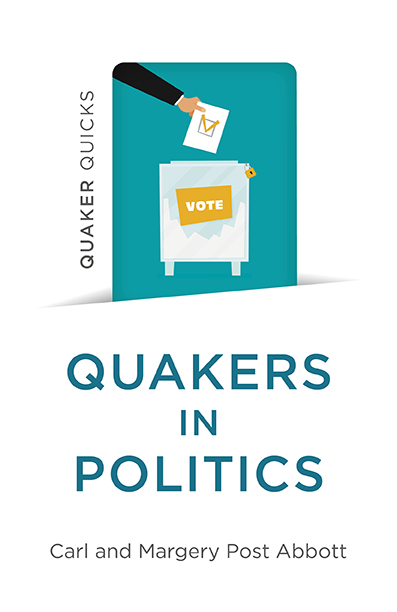Quaker Quicks - Quakers in Politics
Quakers bring a special approach to political action that draws on 360 years of activism.

Quakers bring a special approach to political action that draws on 360 years of activism.
Quakers bring a special approach to political action that draws on 360 years of activism.
Public policy (general), Quaker, Religion, politics & state
In Quakers and Politics, Carl and Margery Post Abbott establish the theological roots of political activism among members of the Society of Friends. By profiling a number of representative individuals and describing the major institutions through which Quakers influence public policy, the Abbotts trace the history of Quaker activism and survey the political involvement of Quakers today. Quakers and Politics brings a special approach to political action that draws on 360 years of activism.
Click on the circles below to see more reviews
"There is much packed into this slim volume, and like all the Quaker Quicks, it is a fast, clear read. Anyone looking for a concise, informative introduction to Friends’ political activities should obtain a copy." ~ Donn Weinholtz - Emeritus professor of educational leadership at the University of Hartford
In this compact and well-organized little book, Carl and Margery Post Abbott consider what it means for Friends to be political "outsiders" (virtuous or not) as well as "insiders." In just 82 pages, they look at our historical record from our earliest years, the ways our beliefs shape our attitudes to politics, and the experiences of Friends who have actually served in political office and in organizations that lobby the politicians. ~ Johan Maurer - Can You Believe?, https://blog.canyoubelieve.me/2023/04/quakers-in-politics-and-what-quakers.html
Quakers have been influential in shaping public policy, even though a relatively small faith movement. Quakers in Politics draws together examples of Quakers who have impacted public policy around the world, both as individuals and members of Quaker organizations, recognizing without exaggerating the impact of the Quaker movement. ~ Lon Fendall, former faculty and administrator at George Fox University and Wilmington College and member of the staff of U.S. Senator Mark Hatfield
This eyes wide open little book by Margery Post Abbott and Carl Abbott fills a much needed gap in the Quaker Quicks series. It's an unflinching look at Quakers and politics. It's both informative and instructive about a question that needs to be examined in these polarized times -- how have, and how do, people of deep faith engage political questions and systems? "Stay grounded in the Spirit to find common ground without giving ground on our basic convictions vision of a just world," they say. Amen! ~ J. Brent Bill, author of Hope and Witness in Dangerous Times and Holy Silence: The Gift of Quaker Spirituality
Quakers have never shied away from confronting the problems of the world, but how is life for Friends who hold elective office now? In Quakers and Politics, Marge and Carl Abbott offer a rich background of the historic Quaker political practice as well as the dynamic ways Friends engage in political life today for ‘the world we seek’. ~ Diane Randall, Executive Secretary, Friends Committee on National Legislation (USA), 2011-2021
A fascinating whistle stop tour of Quakers in politics over the years, drawing on examples of Quaker political work from around the world. A great read for Quakers and non-Quakers alike. ~ Michael Eccles, Friends World Committee for Consultation